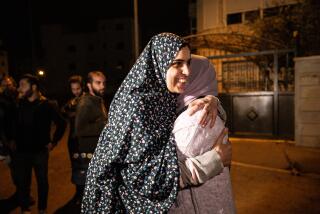Allies Exult as Bosnian Serbs Surrender Arms
BRUSSELS — Frequently over the past months, senior officials at NATO headquarters here have privately exhibited growing frustration at the failure of the United Nations to defend the weapons exclusion zones it declared in Bosnia-Herzegovina. Saturday, that frustration had vanished.
Within hours of NATO’s air strike Friday against Bosnian Serb weaponry operating in the U.N.-declared exclusion zone around the capital, Sarajevo, a Bosnian Serb political leader promised to give back heavy weapons his forces had stolen from a U.N. depot. Then the rebels actually returned them.
By late Saturday, the U.N. Protection Force reported that Bosnian Serb forces had handed back a Soviet-built T-55 tank, two armored personnel carriers and a Praga antiaircraft gun stolen early the previous day from a Sarajevo containment yard being guarded by a U.N. peacekeeping unit from Ukraine.
A fifth weapon, an antiaircraft gun taken in a separate raid on a U.N. site, was also returned for U.N. safekeeping, mission spokesman Maj. Rob Annink told reporters in Sarajevo.
While deep concern persists over widespread truce violations and the Balkan war’s potential to spread, the North Atlantic Treaty Organization air strike requested Friday by the U.N. Protection Force appeared to put Bosnian Serb belligerents on notice that the international community will not tolerate a resumption of the siege of Sarajevo.
Even the rebels’ longtime patron, Serbia, has apparently taken a hard line with the insurgents.
Rump Yugoslavia, made up of Serbia and Montenegro, severed all political and economic ties with the Bosnian Serbs on Thursday and closed its border to commercial traffic.
On Saturday, Serbian border police turned back hundreds of trucks, many carrying food, trying to cross into Bosnian Serb territory, Reuters news service reported.
To be sure, the allies’ showdown was an isolated victory over the Bosnian Serbs, who continue their flagrant violations of the exclusion zones and already possess a colossal predominance in arms over the Muslim-led government forces.
At least six mortar rounds have been fired by the rebels into Sarajevo civilian neighborhoods over the past week--an ominous reminder of how easily the siege that terrorized the capital for 22 months could be restarted.
Sniper fire from Bosnian Serb positions just across the Miljacka River in central Sarajevo has so intensified since the rebels spurned an international peace proposal July 19 that at least a dozen people have been killed or wounded and service on the city’s tram network, which was restored in March to the cheers and tears of long-deprived Sarajevans, has been suspended more often than not.
But U.N. peacekeeping officials in Bosnia seemed eager to take advantage of the boost in credibility that Friday’s symbolic air strike provided.
The commander of U.N. forces in Bosnia, British Lt. Gen. Michael Rose, warned the rebels that they could face further air attacks unless they surrender dozens of other heavy weapons they are known to have in violation of the Sarajevo exclusion zone.
Mission officers also are working on plans for a house-to-house search for snipers in Sarajevo to wipe out the greatest and most persistent menace to civilians, a U.N. source at mission headquarters in Zagreb, Croatia, reported.
The focus on keeping what has been a relative peace in the Bosnian capital for the past five months appeared to demonstrate NATO and U.N. resolve to provide genuine protection to at least the most visible of Bosnia’s six U.N.-designated havens.
Friday’s air strike, which destroyed an antitank gun of little military value, was considered more important for the line it drew after a period of several months in which international resolve to enforce the exclusion zone around Sarajevo had been clearly flagging.
“We wanted to send a message,” said the U.N. Protection Force commander, French Gen. Bertrand de Lapresle, suggesting that the rebels must now reckon with similar sanctions if they persist with violations.
But the NATO action, which U.N. officials took pains to describe as “a proportionate response” to the Bosnian Serb weapons heists, stirred some fears in Zagreb and Sarajevo that the international community has simply upped the ante for enforcing its own resolutions.
There is now little the U.N. mission can do to force the withdrawal of other heavy weapons violating the exclusion zones, short of bombing some of the more strategic positions to show the rebels that the allies mean business.
Violations are even more blatant at the weapons exclusion zone proclaimed by NATO around the embattled eastern enclave of Gorazde, another U.N.-designated “safe area” that the Bosnian Serbs have been attacking with impunity.
Friday’s air action, initiated by Rose, marked one of the few times during the 28-month Serbian rebellion in Bosnia that the U.N. mission and NATO combined to actually follow through on one of the international community’s many verbal threats to take action if the rebels continued to ignore their demands.
“The system is not perfect, but something had to be done in the face of such a flagrant violation,” Rose said Saturday.
The easing of the siege of Sarajevo was largely a result of NATO’s threat to bomb heavy weapons left within striking range of the capital after the withdrawal deadline of Feb. 21.
But Rose has taken personal pride in his association with what was likely the most significant accomplishment of the entire U.N. mission in the Balkans.
NATO officials here, pleased both at the chance to defend the exclusion zone and at the strike’s success, saw the chain of events as a positive development that, in the words of one senior official, “sent the right signal and triggered the proper response.”
“I don’t know if it makes us look good, but it certainly reinforces our credibility,” this official said. “I had my personal doubts that they’d ask for air strikes, but they did and they went according to plan. If there are going to be weapons exclusion zones, they should be enforced.”
John Jeffrey, a spokesman at NATO’s Southern European Command headquarters in Naples, Italy, reported that the skies over Bosnia were quiet Saturday.
“We are flying what we consider to be the appropriate number of missions (over Bosnia-Herzegovina), and there have been no incidents,” he said.
Western diplomats based in the Balkans, however, were more skeptical of the sincerity of the rebels’ purported contrition.
They pointed to a pattern of escalating Bosnian Serb provocations throughout the course of the war that have pushed a reluctant international community into firmer and more frequent applications of force.
“It is safe to say they will continue probing the limits of the West’s willingness to use air power,” one diplomat said. “It is less easy to predict how far the allies are prepared to go in using it.”
Marshall reported from Brussels and Williams from Zagreb, Croatia.
More to Read
Sign up for Essential California
The most important California stories and recommendations in your inbox every morning.
You may occasionally receive promotional content from the Los Angeles Times.











